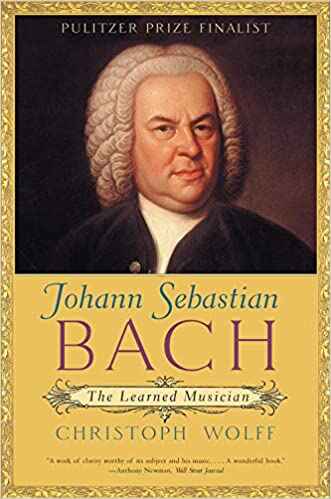
After 26 years in the service of the German city of Leipzig, Johann Sebastian Bach died on July 28, 1750. The Bach-year is still young but has already produced two highlights: Mischa Maisky’s recordings of Bach’s six suites for solo violoncello as well as the most complete Bach-biography until today, written by Christoph Wolff: Johann Sebastian Bach. The Learned Musician [ Amazon.com, Amazon.co.uk, Amazon.fr, Amazon.de.].
Christoph Wolff is modest and stresses the fact that the research on Bach is far from finished. At any time, new sources can be found, as happened during his writing of the biography Johann Sebastian Bach: The Learned Musician. Regarding the composer’s works, Wolff estimates that only 15 to 20% of his music has survived. For his time in Weimar alone, around 200 compositions have probably been lost forever. 40% of his cantatas written in Leipzig have never been found.
Wolff concentrates his narrative on the life of Bach, but stresses at the same time the important lack of significant information. He states that it would be possible to write entire chapters on what we do not know or on what is questionable in our knowledge about Bach. Still, Wolff was able in his more than 600 pages, to bring to life the essence of Bach and his personality. The author renounces a detailed analysis of Bach’s compositions. This will follow in a separate book to be published on Bach’s stylistic and technical developments which will complement the now presented biographical portrait.
The author, Christoph Wolff has been a professor of music at Harvard University, Cambridge, Massachusetts since 1976. From 1963 to 1969, he taught at the University of Erlangen (Germany) and also spent a year as guest professor at the University of Basel (Switzerland). Since 1990 he has been a professor at the University in Freiburg i.Br. (Germany). Therefore, Wolff is at ease with the German language. At the same time, he is one of the best specialists on Bach. He is part of the editorial team of the New Bach Edition and co-editor of the Bach Yearbook. Among Wolff’s publications are: Bach: Essays on His Life and Music (Cambridge 1991, 3/1996), Die Bach Familie (Stuttgart 1994) and, as editor Die Welt der Bach Kantaten in three volumes (Stuttgart 1996-99).
Johann Sebastian Bach was born into a family of musicians with many branches which had existed for several generations and continued after Bach’s death. Based on the rare available sources, Wolff asserts that Bach’s early work even before 1705 shows that Bach gained an early mastery as a composer as well as a musician. This constitutes a new assessment of his early work, not based on new research results or discoveries but on a reinterpretation of the available sources.
The subtitle of Wolff’s biography, The Learned Musician, tells us to what extent Johann Sebastian was different from his relatives and how he saw himself. At the same time, it is an objective characterization of Bach. His musical philosophy was based on a scientific atmosphere of research and teaching, connected with a spirit of an explorer and inventor. Bach saw himself not as a musician, but as a “musical scientist” who wrote works of “musical science”. At the age of 15, he chose an academic education over a musical apprenticeship and, in his last decade in Leipzig, he reduced his duties as cantor and director of music at the city’s principal churches in favor of his work as a composer.
Bach maintained close relations to the University of Leipzig and professors in very different fields. A professor of philosophy was godfather to one of his sons, the wife of a professor of theology was godmother to one of his daughters. A professor of logic and physics wrote the libretto for one of his cantatas and a professor of law commissioned a cantata, etc. In short, the academic world mirrored the themes Bach himself was preoccupied with: the relationship between logic and religion, nature, science and god. Unfortunately, there are no material sources illustrating what Bach’s thoughts and convictions were, but Wolff’s study makes clear that Bach’s relation to the academic world was unusually close for a choirmaster and organist of his time. Although Bach went far beyond being a “musical craftsman”, he was still a child of his era. He was not an independent composer as they emerged in the 19th century, but a man in the service of a Prince or representatives of German cities. He fought many battles with his superiors and even spent a month in jail for this reason.
Wolff agrees with Daniel Schubart, a 18th-century critic and musician, who once said that what Newton means to physics, Bach means to music. He elevated it to a science that he systematically explored. Musical instruments and musical theory where his laboratory. Although Bach hardly left the Weimar and Leipzig region and never went abroad – in contrast to his cosmopolitan contemporaries Händel and Telemann – his compositions reflect better the encounter with the musical world of his time because they were based on the scientific study of music. According to Wolff, if Bach has created a revolution, it is based on his theory of composition which integrated the up to then separated principals of general bass, harmony and counterpoint. The most important compositions on the didactic level are in this regard the Well-tempered Piano and the collection of more than 370 four-voice chorals, because they uncover the perspectives of harmonic tonality, according to Wolff.
Article based on the German edition by S. Fischer added on June 1, 2000. Links to new editions of the biography added on February 14, 2002: order the book from Amazon.com, Amazon.co.uk, Amazon.fr, Amazon.de.